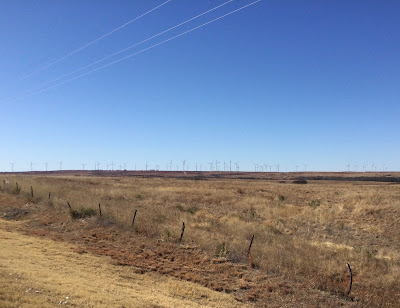Just what I didn’t need, the fiercest wind of the trip blasted me for one hundred miles as I headed north to Woodward. The twenty-mile per hour wall of air had me in my small chain ring as if I were straining up a steep climb. It was a rare wind that blew through the night dropping the temperature into the low teens. The chocolate milk in my insulated water bottle didn’t freeze in my tent, but when I commenced riding the nozzle of my water bottle froze, so if I wanted a drink I had to stop and unscrew the top. I didn’t mind stopping at all, as my legs welcomed any reprieve.
My effort lessened a bit when the road angled northwest and I wasn’t inflicted with the full brunt of the wind. Somewhere along the way I passed a thousand miles for this trip, but there was no celebrating it. There were no wind breaks out in these wide spoken spaces. I took advantage of a big roll of hay just off the road to duck behind for a spell to get some food into me and revive the legs. A slow freight train on tracks paralleling the road slightly blunted the wind for a few minutes.
After one day of it, the wind finally blew itself out and diminished to a slight breeze, though the temperatures remained frigid, not getting above freezing until early afternoon. I counted off the miles to Woodward and it’s Carnegie. That would put an end to my ordeal, as from there I would turn south to Elk City and have the wind as an ally.
As dark settled in I came upon a large oil refinery. I could have set up camp along one of its fences, but there was a dirt road on the opposite side of the road with overgrown brush between it and a rickety barbed wire fence. I was hoping I might find a break in the fence as I had the night before, but none appeared. Half a mile down the road I came upon what looked like an abandoned farmstead. The gate to it was just a looped chain without a lock.

The Carnegie in Woodward now served as the base for the city’s fleet of maintenance vehicles. It was a latter-day Carnegie, less ornate than the early Carnegies, when communities tried to match or outdo nearby Carnegies in their grandiosity. Carnegie came to discourage attention-grabbing features. His libraries were still notable, well-constructed buildings with a quiet dignity, but without the wow-factor of many of its older sisters. Carnegie’s okay for the dome in Guthrie was an aberration, obliging the request of the women’s group who asked for an additional five thousand dollars to the original twenty thousand dollar grant so their building could have a dome to make it a truly special building in the territory that had yet to become a state.
The Elk City Carnegie was likewise without columns or accoutrements that could steal one’s breath, but still a deeply satisfying building that retained all the nobility it had when it was built over a century ago and could hold one’s gaze beholding its charm. It was presently undergoing a significant enough renovation that all its books had been removed to a store just down the street. The library resided on Broadway Street just a block over from Route 66, the third and last of the Carnegies I have visited in a town intersected by the “Mother Road.”









No comments:
Post a Comment